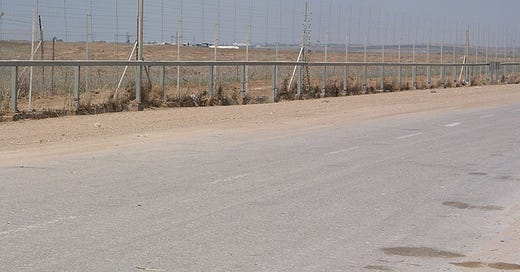In the wake of an atrocity - or a series of them, as with those that followed the recent Hamas raid into Israel - it is easy to be swept up in a righteous fervor for ‘justice’ that turns out to be nothing more than vengeance. The famous “9/12” attitude that overcame the US was just one of many examples. Frequently though the proximate villains are inaccessible - they died carrying out their nefarious deeds (as happened both in New York and southern Israel) or they escape beyond our reach. In such a case, the next most satisfying course of action may seem to be to attack whatever group the perpetrators are a part of.
To a liberal, though, this should be unthinkable.
A fascist sees the state as the pinnacle of human existence and so naturally carries out punishments on people because of their membership in a state or ethnicity. A theocrat sees not individuals but a community of the faithful - and communities of the unfaithful who might call upon themselves communal guilt. Even a Communist may see whole classes of people as perpetrators and thus justify punishing even the relatively powerless among them - their children.
But for a liberal, the fundamental unit of society is the individual, even if that individual is enmeshed in myriad other structures. John Stuart Mill wrote that
“in proportion to the development of his individuality, each person becomes more valuable to himself, and is therefore capable of being more valuable to others” in explaining why “free development of individuality is one of the leading essentials of well-being”. If one is forever deemed guilty because of the actions of one’s co-religionists, co-ethnics, or other peers in some regard, one cannot reasonably develop this individuality.
This is obviously true in the most pressing case of collective punishment in the news today - the punishing of the people of Gaza. The shutting off or strict rationing of water, as Israel has done, serves no military utility - it is merely a way to punish the population, to coerce them. How then can an individua Gazan develop and act on their conscience if the actions of an entirely separate individual who shoots an Israeli civilian or fires a rocket can redound on the innocent individual’s head? It flies in the face of Mill’s conception of individuality, and thus cannot be reconciled to liberalism.
It is furthermore at odds with an enlightened conception of justice. Cesar Beccaria, whose seminal work On Crimes and Punishments laid out many of the western principles of justice we cherish today, wrote that the purpose of punishments was that they were “necessary to prevent the despotism of each individual from plunging society into its former chaos. Such motives are the punishment established against the infractors of the laws.” This a collective punishment against a class, a religion, or an ethnicity cannot do. Beccaria even wars against confiscating the property of arrested or executed criminals, on the grounds that in such a case “a whole family is punished for the crime of an individual”.
This does not mean that individuals never suffer for the misdeeds of others, or that preventing that suffering in all cases should restrain liberals from taking any action at all - a great many Southerners suffered privation in the Union blockade during the American Civil War, but the blockade served a useful purpose to prevent the arming of the Confederate Army and thus, in the end, accelerated the liberation of many millions of enslaved people.
But this suffering is regrettable and *unintentional*. It is not inflicted as a species of punishment, and to the extent that it can be mitigated, it should be. Denying the citizens of Gaza water or medicine on account of their actions taken by other Gazans cannot be justified on any liberal principle - and the same applies to any effort to reduce individuals to members of a group and assign them guilt on that account.




